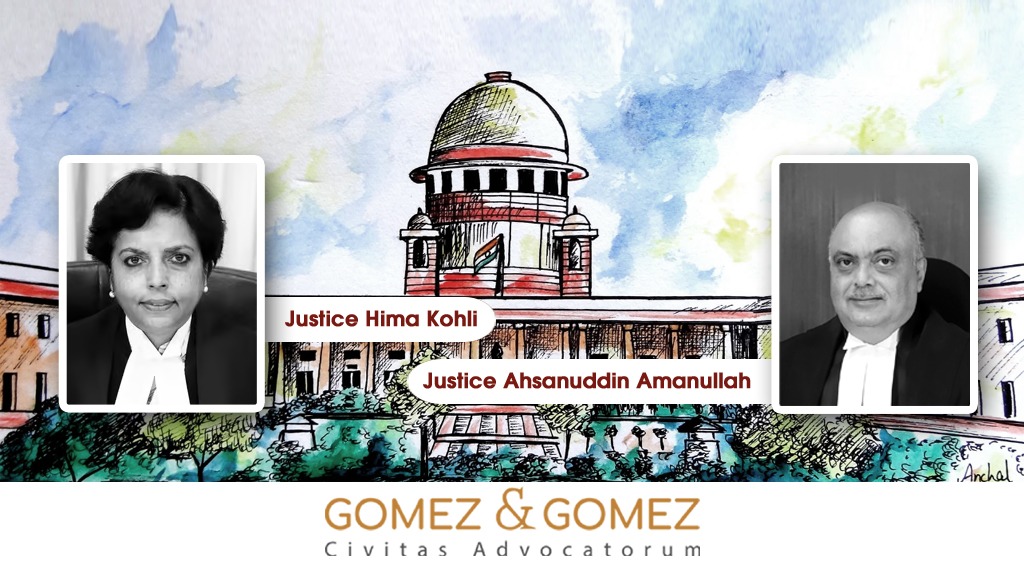FAMILY COURT COMPETENT TO GRANT ANTI-SUIT INJUNCTION AGAINST PROCEEDINGS IN A FOREIGN COURT FOR PROPERTIES SITUATED IN INDIA – SUPREME COURT

ANTI SUIT INJUCTION
A Bench comprising Justice Hima Kohli and Justice Ahsanuddin Amanullah dismissed a Special Leave Petition filed by a husband against his wife, challenging a judgment passed by a Division Bench of the Kerala High Court, granting an anti suit injunction, in her favour.
The marriage between the parties was solemnized on 11.12.1999. Two children re born out of wedlock, the elder one aged 19 years, and the younger 16 years. Both husband and wife migrated to Canada and acquired properties in India, with an intention to settle down in India. However, the wife became a Citizen of Canada, while the husband retained his Indian Citizenship. A Matrimonial discord surfaced in the family, following which the wife approached the Family Court, Ernakulam, Kerala, for dissolution of marriage, while the husband moved the Family Court, Kollam, Kerala for partition concerning joint properties. An exparte divorce and an exparte preliminary decree was passed in the proceedings by the respective courts, The wife is contesting the exparte decree, while the marriage remains dissolved.
In the meantime, the husband approached the Superior Court of Justice, Canada raising the following claims:
- Support for child(ren) – table amount
- Support for child(ren) – other than table amount
- Decision-making responsibility for the child(ren)
- Parenting time with child(ren)
- Restraining/non-harassment order
- Indexing spousal support
- Declaration of percentage
- Guardianship over child’s property
- Equalization of net family property.
The claim for equalization of net family property, in the present case, would include the matrimonial assets of the parties, situated in India. The wife, responded by approaching the Family Court Kollam, by filing an suit for an anti-suit injunction in the following manner, “Grant an anti-suit injunction restraining the respondent from filing any proceedings or continuing any proceedings against the petitioner in courts in Canada in relation to the marriage between the petitioner, the respondent, or their properties or either of them or for recovery of any amount.”
The Family Court dismissed the application for a temporary anti-suit injunction, filed by the wife, along with the original suit. Consequently, she approached the High Court, invoking Article 227 of the Constitution of India, which was disposed of in the following manner.
“Keeping in view the peculiar facts and circumstance narrated above, we modify the order of the trial court and injunct respondent no. 1 not to state the claim in respect of properties in joint ownership or in individual names situated in India. It is made clear that as regards other reliefs or reliefs with regard to the property in Canada, there shall be no such injunction. The question of law raised above is awarded accordingly. Petition stands disposed of”
The doctrine of lex sites is found to be applicable in determining the jurisdiction of the Court, regarding immovable property situated in India. The Kerala High Court has distinguished the decision of the Supreme Court, in Dinesh Singh Thakur vs. Sonal Thakur (2018 KHC 6299), while granting the relief to the wife.
The judgment of the Division Bench of the Kerala High Court, as confirmed by the Supreme Court, following the dismissal of the Special leave appeal is an important milestone in the evolution of the matrimonial jurisdiction in the country.
The legal team of Gomez and Gomez had the opportunity to appear before the Family Court, Kollam, Kerala High Court, and the Supreme Court of India, in this case.

